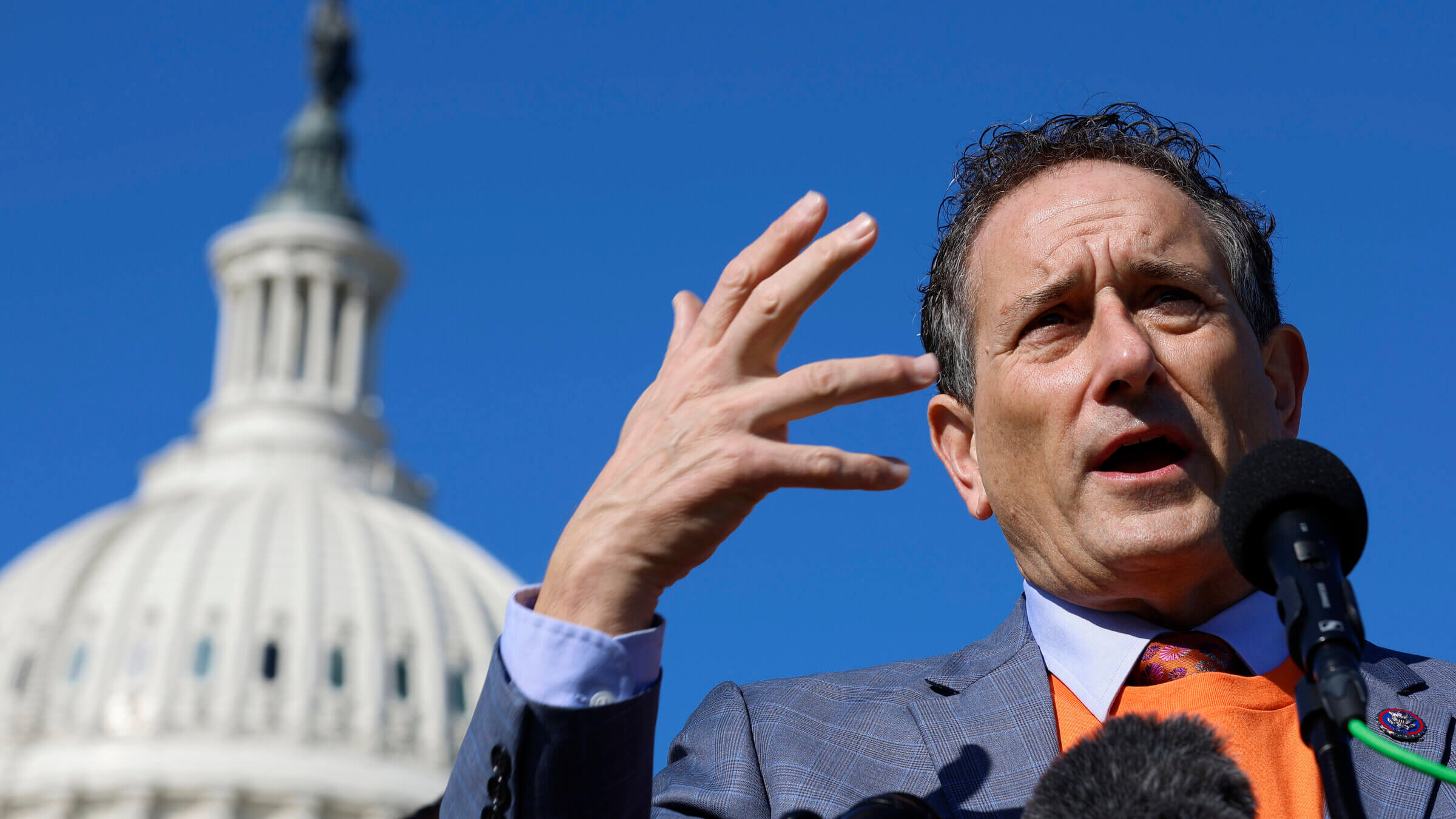Jewish congressman calls attacks by AIPAC and other pro-Israel groups ‘ridiculous’
Meanwhile, more than 100 Jewish leaders, activists and rabbis issued a letter of support for Rep. Andy Levin in Michigan House race

Rep. Andy Levin (D-MI) announces legislation on safe gun storage during a news conference outside the U.S. Capitol on February 08, 2022 Photo by Chip Somodevilla/Getty Images
Andy Levin, a two-term Jewish congressman from Detroit, is pushing back against attacks by groups that portray him as being hostile to Israel as he faces a tough re-election battle.
The American Israel Public Affairs Committee and other pro-Israel groups are actively backing his non-Jewish rival, Rep. Haley Stevens, in the rare incumbent-vs.-incumbent primary to represent Michigan’s redrawn 11th Congressional District. AIPAC’s political action committee raised $300,000 in earmarked contributions to boost Stevens, and the organization’s former president, David Victor, accused Levin of being “arguably the most corrosive member of Congress to the U.S.-Israel relationship.”
“What I really think is happening, and won’t work, is a politics of intimidation in the Jewish community to try to tear me down,” Levin, 61, said in an interview while visiting New York City to fundraise.
Levin, a member of the House Foreign Affairs Committee, drew the ire of AIPAC and its allies for a bill he introduced last year that would advance the two-state solution and restrict Israel from using U.S. taxpayer dollars to expand or annex settlements in the occupied West Bank. Another group, the Democratic Majority for Israel, accused Levin of “stirring up anti-Israel hostility.” Levin has also publicly defended his progressive colleagues, Reps. Rashida Tlaib from Michigan and Ilhan Omar from Minnesota, who have been accused of antisemitism and openly support the Boycott, Divestment and Sanctions movement targeting Israel.
“The idea that the right-wing on Israel crowd has some monopoly of loving Israel is nonsense,” Levin said, defending his record in support of Israel and the role he’s played in building bridges with the far left. “I am not going to put my finger in the wind and see which way it’s blowing and do things for political advantage.”
Levin has lived in the newly-drawn 11th District for most of his life, which includes some of the Jewish neighborhoods he currently represents in the 9th District. Stevens recently moved into the new district, which contains just 40% of her old district that she was elected to in 2018. Levin estimated the Jewish population at eight percent of the electorate.
Levin maintained the views he is expressing are in line with his Jewish values, the “teachings of the Torah” and his upbringing as part of a Jewish political dynasty in Michigan. He is the son of former Congressman Sander Levin and the nephew of the late Sen. Carl Levin, the longest-serving siblings in the history of the U.S. Congress. Until his election in 2018, Levin served as president of Congregation T’chiyah, a Reconstructionist synagogue in Oak Park, Michigan, and chair of the steering committee of Detroit Jews for Justice.

Levin pointed out that his dad and uncle were not always in lockstep with AIPAC. Carl Levin spearheaded a letter in 1988 supporting then-Secretary of State George Shultz’s Middle East peace initiative and criticizing then-Prime Minister Yitzhak Shamir for rejecting the land-for-peace formula. He ran through the language with AIPAC, but once it leaked, the pro-Israel lobby came out against it. Sander Levin, then serving as dean of the House’s informal Jewish Caucus, was the first Jewish member to publicly support the Iran nuclear deal in 2015.
Levin: I have ‘a pretty f***ing conventional’ view of Israel’
Abe Foxman, the former head of the Anti-Defamation League, said Levin “uses his Jewishness, respected political family name as a cover for softness” on Israel and antisemitism. Foxman published an op-ed Tuesday in The Detroit News castigating Levin’s approach. “Levin is more dangerous than his anti-Israel Muslim colleagues in Congress in undermining America’s unique support for Israel because he constantly criticized Israel under the guise of being Jewish and Israel’s best friend,” Foxman told the Forward.
Levin suggested that AIPAC is irritated by the fact being the ”most identifiable” Jewish member with “a pretty f***ing conventional” view of Israel – listing his support for aid to Israel and the replenishment of the Iron Dome missile defense system and opposition to BDS – who has stood up to say that “the only way to have a secure and peaceful homeland for my people is to fully realize the political human rights of the Palestinians.”
The Two-State Solution Act that Levin introduced last September has 45 co-sponsors but it’s unlikely to get a vote in the House Foreign Affairs Committee this year.
He stressed that he sees himself as an interlocutor who can inspire the next generation of Congress members to stand in line with the idea of two states for two people – supporting Israel’s security while standing up for Palestinian rights. “Here I am a Jew, a proud Zionist, who can talk to people across lines,” he said. “I can talk to IfNotNow, I can talk to JVP [Jewish Voice for Peace], I can talk to Palestinians, I can talk to other Arab Americans, I can talk to anybody.”

In 2019, after condemning Ilhan Omar’s tweet about congressional support for Israel being “all about the Benjamins,” Levin helped organize an interfaith meeting between Muslim, Black and Jewish House Democrats to ease tensions and build trust. “This was the most important thing I’ve done in Congress in terms of relationships,” Levin said, adding that since then Omar has been more careful with her statements. “I’m proud of that. I feel equipped to play a role of getting our little space at the intersectional table.”
The congressman said he disagreed with Jonathan Greenblatt, the ADL’s chief executive, who stated in a speech last week that “anti-Zionism is antisemitism.” Tlaib’s description of Israel as an apartheid state and support of a one-state solution, he said, is not antisemitic, but rather a “naive” view. “If you say ‘Push the Jews into the sea,’ that’s unacceptable” he explained. “If you say, as the Amnesty International U.S. director said, that Israel has to cease to exist as a Jewish state, I think that crosses a line.”
AIPAC vs. J Street
Levin said that he might have been caught up in the middle of a fight between AIPAC and the liberal pro-peace J Street, who has increased its influence on Capitol Hill in recent years. “It’s ridiculous,” he said. “I think that AIPAC is so freaked out by J Street.”
JStreet’s PAC has fundraised $238,000 in contributions for Levin’s campaign. Logan Bayroff, the group’s spokesman, called it “deeply alarming” to see groups like AIPAC investing so much time and money in an effort to smear and defeat a candidate who, in fact, reflects the views and principles of a clear majority of American Jews.”
Levin has also received the support of several Jewish colleagues: Reps. Jerry Nadler of New York, Jamie Raskin of Maryland and Steve Cohen of Tennessee. Last week, a group of more than 100 Jewish leaders, activists and rabbis issued a letter of support for Levin, saying his “connection to Jewish identity and community have served as a touchstone for him.”
Levin said the outcome of the primary is “hugely consequential” for the American Jewish community. “When I win, then it’s like, some of this politics of intimidation will go away,” he said, claiming he has the momentum ahead of the August 4 primary and that he’s leading with Jewish voters in internal polling. “If I were to lose, I think it sets back the idea of that.”
Levin and the Young Democrats of Michigan slammed Stevens for taking AIPAC’s endorsement after it announced the backing of Republicans who voted to overturn the election of Joe Biden as president. On Monday, he endorsed two progressive House candidates, Summer Lee in Pennsylvania’s 12th District and Erica Smith in North Carolina’s 1st District who are targets of AIPAC’s Super PAC, United Democracy Project. “It is shameful that organizations that endorse and support insurrectionist Republicans are wading into these Democratic primaries, spending millions trying to drown out the voices of candidates like Summer and Erica,” he said.
Meanwhile, the Stevens campaign suggested Levin is being hypocritical in his criticism, noting that Levin also accepted donations from corporate PACs and groups who are also backing Republicans who voted to overturn the 2020 election. According to the watchdog group Citizens for Responsibility and Ethics in Washington (CREW) and reported by Jewish Insider, a number of political action committees – representing major auto, insurance and financial services industries – have contributed a total of $55,500 to the Levin campaign since he filed for re-election last year.
“Andy Levin has taken thousands of dollars in corporate PAC money from organizations that have made the same bipartisan donations over which he is desperately and hypocritically attacking Haley Stevens,” Larkin Parker, a spokesperson for the Stevens campaign, told Jewish Insider. Each of these groups have also funneled funds to the Stevens campaign, according to the report.
AIPAC was quick to highlight the report to mock Levin and the Jewish groups supporting him.
Levin’s campaign spokesperson Jenny Byer pushed back, saying it does not compare with the $300,000 in contributions bundled by AIPAC for Stevens.
Marshall Wittmann, an AIPAC spokesperson, defended the organization’s involvement in the Michigan race. “We are proud to engage in the democratic process to support Congresswoman Stevens who has a strong record of support for the US-Israel relationship in clear contrast to her opponent,” he said.
This post was updated on 05-11-2022
A message from our Publisher & CEO Rachel Fishman Feddersen

I hope you appreciated this article. Before you go, I’d like to ask you to please support the Forward’s award-winning, nonprofit journalism so that we can be prepared for whatever news 2025 brings.
At a time when other newsrooms are closing or cutting back, the Forward has removed its paywall and invested additional resources to report on the ground from Israel and around the U.S. on the impact of the war, rising antisemitism and polarized discourse.
Readers like you make it all possible. Support our work by becoming a Forward Member and connect with our journalism and your community.
— Rachel Fishman Feddersen, Publisher and CEO





























